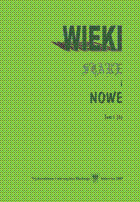Ksiądz biskup August Hlond wobec katolików niemieckiego pochodzenia na obszarze polskiego Górnego Śląska (1922—1926)
Father August Hlond versus the Catholics of a German origin in the Polish area of Upper Silesia (1922—1926)Ksiądz biskup August Hlond wobec katolików
Author(s): Lech KrzyżanowskiSubject(s): History
Published by: Wydawnictwo Uniwersytetu Śląskiego
Summary/Abstract: In the first half of the 1920s, father August Hlond worked in the Polish part of Upper Silesia, performing the function of an apostle administrator and, subsequently, a bishop in Katowice. Both nominations were decided upon by Pius XI the Pope, taking into consideration different virtues of the priest’s character. The most valuable among them were the abilities to resolve conflicts appearing inside the Catholic camp. A national antagonism, dividing the Catholic environment into the Polish and German group was the strongest in Upper Silesia. Poles dominated in numbers, but the group of German Catholics also demanded a guarantee of their linguistic rights in pastoral work. Additionally, the situation was complicated by their engagement in an argument of political, Polish and German organizations, increasing the temperature of a national conflict. In the light of this complicated internal situation, father A. Hlond used mediation methods and tried to provide the feuding sides with the highest standard of pastoral care on the part of the church. It is how, for instance, the politics of tolerance towards German rights of the congregation could be explained. It brought positive results expressed in a substantial decrease of the intensity of social conflicts. It became especially evident after A. Hlond the bishop had already left Upper Silesia and taken on the function of the primate of Poland.
Journal: Wieki Stare i Nowe
- Issue Year: 6/2009
- Issue No: 1
- Page Range: 212-227
- Page Count: 16
- Language: Polish

